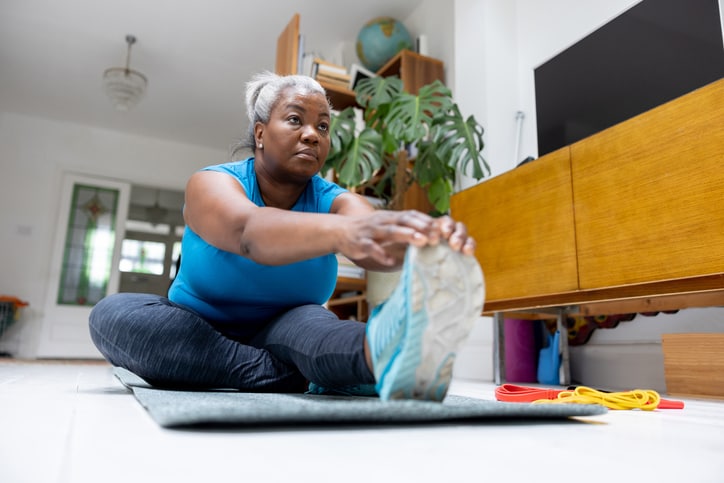Caregiving for an aging loved one is difficult in any situation, but when you’re caring for a spouse or partner, it means your entire world is shifting. “Moving from partner or lover to caregiver is a major change in interpersonal dynamics and impacts the way the partnership previously worked,” says Iris Waichler, a licensed clinical social worker in Chicago who specializes in senior care, caregiving and family relationships. “It is no longer an equal partnership.”
The nature of the former relationship can impact how things play out, according to Waichler. “For example, if the caregiver was dependent on their partner, it will feel more overwhelming to the caregiver,” she explains. Regardless, it’s a massive and difficult change for both parties no matter what — and one that will take getting used to.
From how the shift will affect your romantic relationship to tips on figuring out how to balance your new role with your old, here’s what the experts say about managing the impact of caregiving for your spouse or partner.
The effects of going from partner to caregiver
There are a number of ways taking on the role of caregiver for your partner or spouse can affect you and your partner, respectively, as well as your relationship.
“Caring for an aging or ailing spouse can be challenging, and the demands can feel endless. Even the most solid relationship can be strained.”
— ALICEA ARDITO, A LICENSED CLINICAL SOCIAL WORKER IN RESTON, VIRGINIA
Caregiving for a partner: how it affects you personally
You feel taxed.
“Caring for an aging or ailing spouse can be challenging, and the demands can feel endless,” says Alicea Ardito, a licensed clinical social worker in Reston, Virginia, who specializes in senior care and issues surrounding aging. “Ongoing caregiving responsibilities can be stressful, exhausting, and at times, it can feel like a thankless job. Even the most solid relationship can be strained by the demands of caregiving.”
Your well-being may be affected.
One of the effects of continuously doing taxing work: It affects your mental, emotional and physical well-being. “The cumulative stress and demands of caregiving can negatively affect the caregiving partner’s mental and physical health,” continues Ardito. “Often, caregivers feel as though they don’t have the time or energy to care for themselves, and they can feel depressed, anxious or overwhelmed.”
Ardito notes a downside in well-being can manifest in the following ways:
- Changes in appetite and sleep.
- Feeling irritable.
- Loss of interest or pleasure.
- Feeling disconnected.
- Difficulty concentrating or staying fully engaged.
There may be a new division of labor.
When taking on the role of caregiver to a partner or spouse, it can also result in taking on new household chores, according to Waichler. “If, prior to becoming incapacitated, your partner managed certain tasks, such as paying bills or budgeting, you may have to assume these roles, as well.”
You’re grieving a number of losses.
“If you previously relied on your partner for emotional support, becoming a caregiving can create enormous feelings of loss, frustration, sadness, helplessness, isolation and even anger,” Waichler notes, adding that, at the same time, folks caring for spouses are also grieving the loss of their partner and the person they loved and knew as they “watch them change due to medical, mental, physical, emotional and/or cognitive changes.”
Your routine changes.
“Caregiving for a spouse can impact your daily routine, how your time is spent together, as well as other relationships, such as friends, adult children, relatives and colleagues,” says Ardito. “Caregiving can impact the amount of time and energy available to nurture these other relationships.”
How caregiving for a partner affects your relationship
Roles shift.
Though obvious, one of the most impactful aspects of going from partner to carer is how it shifts previous relationship roles, according to Dr. Fawn Cothran, a registered nurse and the Hunt Research Director at the National Alliance for Caregiving.
“When a spouse becomes a caregiver, it results in a role shift for both parties and changes relationship dynamics, which leaves both people in unfamiliar territory,” says Cothran.
And while caregiving is stressful business, being on the receiving end of such a drastic role shift comes with its own difficulties. “When someone who’s been independent suddenly needs care, it can be very frustrating for them,” Waicher says, adding that, from both parties, there can be “feelings of anger, grief, frustration, uncertainty, sadness, loss and fear of the future.”
The following can also result from role shifts in the relationship, according to Ardito and Waichler:
- Burnout from caregiving can result in a partner withdrawing from the relationship.
- Partners may feel less like partners or lovers and more like “care providers” and “care recipients.”
- There may be shifts in power within the relationship, which affects how partners feel about themselves and each other.
- New boundaries and relationship guidelines must be established with these new roles. “These feelings may be experienced in different ways and intensities further stressing their relationship,” says Waichler.
“Communication may actually improve when spouses/partners are able to share their wants and needs and discuss what is working well and what isn’t with the caregiving situation.”
— ALICEA ARDITO
You may experience a loss or decline in intimacy.
Says Ardito: “There may be the loss of physical or emotional intimacy due to cognitive or physical limitations of the care recipient, or the emotional and physical burnout from caregiving.”
You could notice improved communication.
“We often think of the negative impacts of going from spouse to caregiver, but there can be positive ways in which relationships can change,” Ardito says. “Communication may actually improve when spouses/partners are able to share their wants and needs and discuss what is working well and what isn’t with the caregiving situation.”
You might foster new intimacy.
“Becoming a caregiver for your partner can also create new intimacy,” Waichler says. “It can be perceived as an act of love and an extension of your loving and supportive relationship. It can expand the boundaries of your previous relationship and be a source of pride for both parties.”
Tips for balancing caregiving and a romantic relationship
Your relationship may never be what it once was, but Ardito, Waichler and Cothran recommend the following tips for finding a healthy balance when you’re caring for a spouse or partner.
Compartmentalize.
“Compartmentalize your role and responsibilities as a caregiver,” says Waichler. “Realistically assess what you can and can’t do and be able to say no to the latter tasks. Then, ask for help with things you can’t do without self-berating or feelings of guilt. For example, if you physically can’t lift or move your partner, it is important to acknowledge this for your safety and your partner’s and arrange for someone else to offer assistance.”
Communicate assertively.
While you may want to do everything, you can’t (see above). It’s important to state what tasks you’re taking on and which you’re not without being wishy-washy. “This involves using assertive communication to clearly establish rules and limits in the relationship,” says Ardito. “This can help both the caregiver and care recipient to feel more empowered.”
Prioritize intimacy.
“Create and continue moments where you can share intimacy,” notes Waicher. “It may be through physical contact, listening to favorite music together, going for a walk in a beautiful place or reading poetry you both loved to share with each other. You can even create a special meal or create an intimate environment with candles and flowers.”
The key: Include things you used to do together that were sources of joy and shared interests as part of your routine whenever possible, says Waicher.
And if enjoying the activities you used to is no longer an option, Cothran recommends trying something new.
Ultimately, according to Ardito, you’ll do best to be intentional with your time and carve out moments together that are free of caregiving duties and responsibilities.
The key: Include things you used to do together that were sources of joy and shared interests as part of your routine whenever possible.
— IRIS WAICHER, A LICENSED CLINICAL SOCIAL WORKER IN CHICAGO
Adjust expectations all around.
It’s important to lower your expectations, according to Cothran. “Try to accept that your new reality is different,” she says. “Make an effort to let go of what was and try to embrace what is.”
Also, if you’re used to being someone who “gets it all done,” shift that expectation, as well. “It’s important to keep in mind that doing your best will look different from day to day,” she adds.
Focus on what’s important.
You’re never going to be able to get it all done, so zero in on your top priorities and remember — there’s a learning curve, notes Cothran. “Take everything as it comes, and decide what’s most important,” she says. “For example, bathing or other routines — figure out if they need to happen now, or they can wait until later, tomorrow or even just be done differently.”
Ask for — and accept — help.
Cothran, Waichler and Arditoo all agree that a “willingness to receive support from other people” is crucial when you’re caregiving. Whether that means getting a much-needed break to recharge or connecting with people in similar positions, having support is crucial.
“If you find you are feeling increasingly overwhelmed and burnout signs increase, you may need to seek counseling to help cope with this major life change,” Waichler says, adding that “online chat rooms are a great place to go for support.”
Two resources she likes are the Family Caregiver Alliance and National Alliance for Caregiving.
“These can offer resources, education, individual and support groups,” she says. “They can also help you feel less alone and isolated and normalize the feelings you are having as a new caregiver.”




